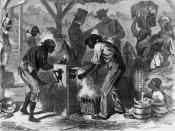Throughout the history of the United States, there have been many world changing inventions. Many of these inventions have had a drastic affect on not only the scientific community but also the political and social environments of the time. During the late 1700's, one such invention significantly changed the economic climate in the southern United States so drastically that it lead to the bloodiest American war in history. Many inventions have had a drastic impact on the Untied States and one of those was the cotton gin which changed life in the South forever.
Eli Whitney was born in Westboro, Massachusetts on December 8, 1765 and attended Yale College. Soon after he graduated, Whitney visited a plantation near Savannah, Georgia and got the idea for the invention that would define him for all future generations (Mirsky, 14). There Whitney quickly learned that Southern planters were in desperate need of a way to make the growing of cotton profitable.
Long-staple cotton, which was easy to separate from its seeds, could be grown only along the coast. The one variety that grew inland had sticky green seeds that were time-consuming to pick out of the balls of cotton and very labor intensive (Woodman, 23). Whitney was encouraged to find a solution to this problem by his employer, Catherine Greene, whose support, both moral and financial, were critical to this effort (Wetzell, 11). At stake was the success of cotton planting throughout the South, especially important at a time when tobacco was declining in profit due to over-supply and soil exhaustion (crop rotation was not yet common practice). Before the cotton gin was introduced, all cotton seeds had to be picked out by hand, usually by slaves ("Effects...", 3). This made cotton growth very costly and time consuming allowing only the largest plantations...



Awesome job
This essay is awesome. It delineates every aspect intricately and in stunning clarity. Keep up the good work! =) Also, omit needless words (see "Elements of Style")
0 out of 0 people found this comment useful.